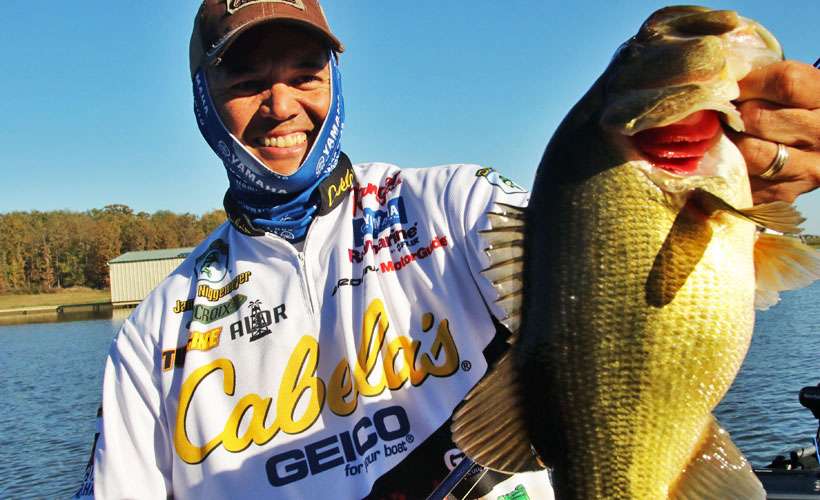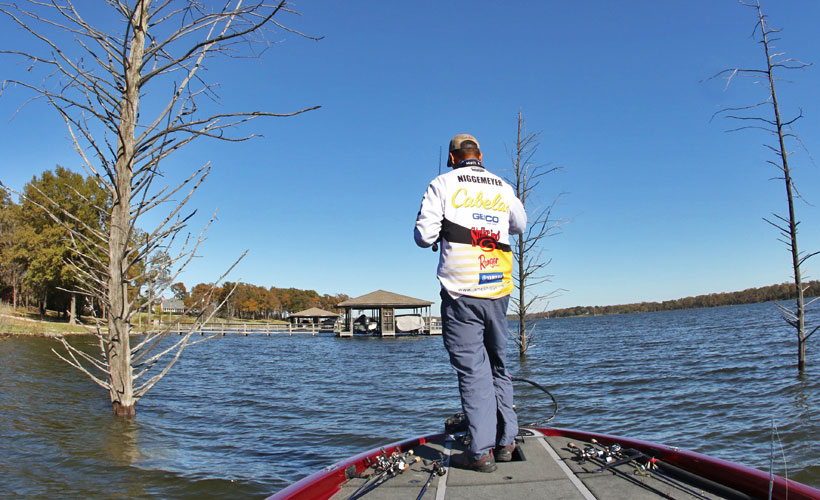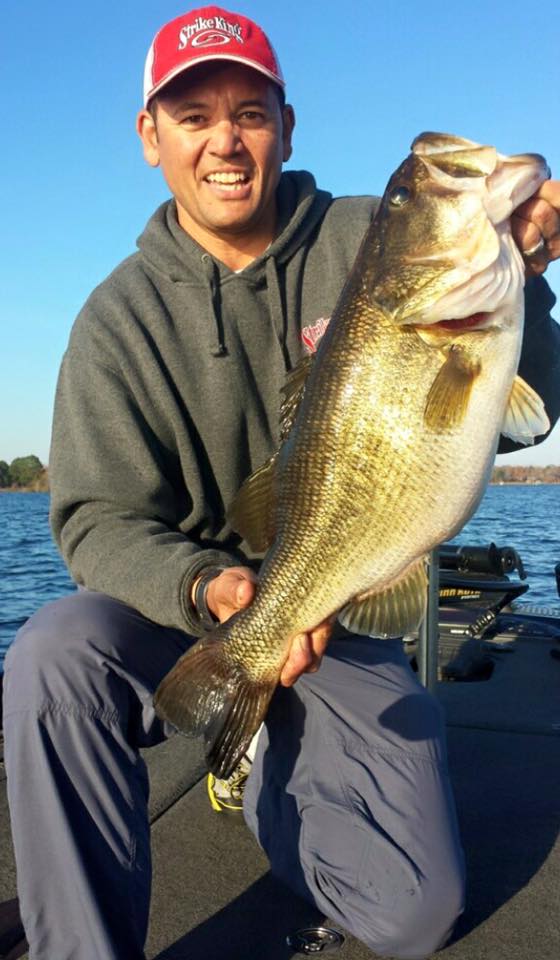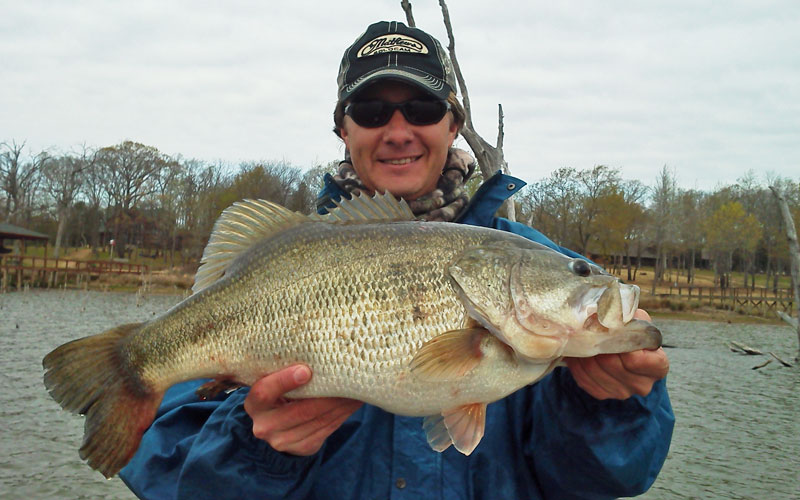
LAKE FORK, Texas – Big fish make James Niggemeyer’s world go around. He’d just like to see more of them.
A 10-pounder in a B.A.S.S. event helped solidify Niggemeyer’s position in the tournament world. Now the Bassmaster Elite Series pro guides on Lake Fork, helping clients pursue what many hope is the biggest bass of their life.
“Lake Fork has a tremendous reputation,” said Niggemeyer, who lives in Van, Texas. “People come year after year hoping to catch their personal best.”
While Niggemeyer’s personal best is an 11-14 on Choke Canyon in a PAA tournament, his top B.A.S.S. catch might be his most important fish ever. He landed a memorable 10-pounder at Santee Cooper nearly a decade ago, and he still provides a vivid description.
“It was a sight fishing deal. I saw her cruising. I threw up there at the bed and she swam off. Then she came from the other direction, and just kind of did a drive by,” said Niggemeyer, soon realizing it had picked up his bait. “I set the hook and starting chopping lily pads … tchk, tchk, tchk. I had 25-pound mono and it was cutting lily pads. I’m like, ‘Omigosh,’ I didn’t know if I was going to get her in.’”
He did, and without that 10-2, Niggemeyer probably wouldn’t have won the 2006 Southern Tour #3, one of his three Bassmaster victories. It was even bigger in that it helped him qualify for the 2007 Elite Series.
Head east, bass man
Niggemeyer grew up in Glendale, Calif., fishing all that region’s “giant, giant bass” lakes. He competed in western B.A.S.S. events starting in 1997, and received some advice that would lead him to Lake Fork and guiding.
It wasn’t long after Mark Davis won the 1995 Bassmaster Classic that Niggemeyer ran into him at a seminar and asked how do you become a bass pro.
“He said you have to spend more time on the water. Unless you’re personally wealthy, you can’t do it. So you’ve got to make money on the water and the only way to do it is guiding,” Niggemeyer said. “So I said, ‘I got to guide.’ I have to get better and spend more time on the water. I just took a page out of his recommendation and that’s how I ended up coming out here.”
Dean Rojas, an old western fishing foe and friend, was also instrumental in that move. Niggemeyer had fished Lake Fork several times, and it was Rojas who kept telling him he should move to the destination lake and guide.
“It’s a natural fit,” Niggemeyer said, “and I wanted to move this way because I wanted to fish B.A.S.S.”
So he pulled up stakes in 2001 and came to Texas. Another angler and his wife would help keep him here. While trying to establish himself, Niggemeyer worked for Mark Park, a Classic qualifier who owned a lure company.
“If they didn’t offer me a job, let me stay in one room in their house — if it wasn’t for them I probably would have headed back to California,” he said. “When I moved, I didn’t really know anybody here. It was a challenge. I don’t know if I’m going to make it financially.”
Several more anglers assisted in other aspects of his life. Kelly Jordon took him to “co-ed softball down in Tyler” but they must “have gone on the wrong night” – wink, wink — because it was singles bible study at Greenacres Baptist Church.
“Not long after that, I gave my life to the Lord, and spiritually, it was huge,” Niggemeyer said.
Good thing, too, because Niggemeyer soon met his spiritual wife-to-be, Sandy, through his friendship with Classic champ and AOY winner Jay Yelas and his wife.
“I got to know him before he moved to Oregon. Jay and Jill are just awesome people,” he said, adding Sandy to the awesome list. “She is the most supportive person I ever could have married. She’s wonderful. She has a saying when I leave the house, ‘Get ‘em, honey, get ‘em.’”
Their daughter Abigail, 7, now recites that line, while son Daniel, 10, wishes he could go along.
Temper expectations
Guides can’t always put anglers on the motherlode. They don’t possess a go-to spot that always produces, Niggemeyer said, adding some folks need to realize there’s a reason it’s called fishing, not catching.
“There’s a degree of the population who think guides have that one magical spot where he can go and always catch fish,” he said. “He’s got the fish named and they can be caught on every cast.”

While there are great days when it might seem that way, Niggemeyer said there’s also good days, just OK days and bad days. He enjoys them all, knowing he’s spending critical time on the water, providing a service while getting the opportunity to hone his craft. While he can’t guarantee it, he sure as fire wants clients to catch fish.
“A guide definitely wants to see you succeed,” he said. “You win, he wins.”
So Niggemeyer admits there is an anxiety to perform, a pressure to catch good fish. The work to figure out fish each day is part of the never-ending bass fishing puzzle, and Lake Fork kicks that up a notch.
“Like tournaments, you want to produce, so there’s definitely some stress levels. We’re on Lake Fork, so the expectation is here,” he said, putting his hand chest high. “Now you’re with James Niggemeyer, an Elite angler, a guy who fishes tournaments on Lake Fork, and now it’s up to here (his hand goes above his head) .That’s just part of the job.”
While admitting Lake Fork isn’t in its heyday, he ranks it among his top five bass lakes. The Texas record largemouth, at 18.18 pounds, was caught here, as well as around half of the state’s top 50 Sharelunker bass. It’s closer than most lakes for many seeking the biggest bass of their life, but Niggemeyer admits it’s like most fisheries in that conditions fluctuate.
 “It’s an awesome lake, and you can go here and have a banner day, think ‘I’m moving here,’” he said. “Or you can go there and say it stunk so bad I never want to go back. And both are the same lake. It’s all about conditions.
“It’s an awesome lake, and you can go here and have a banner day, think ‘I’m moving here,’” he said. “Or you can go there and say it stunk so bad I never want to go back. And both are the same lake. It’s all about conditions.
“I’ve had a lot of people catch their personal best with me, and that speaks to the quality of the fishery. It doesn’t mean they’re willing to bite the paint off a crankbait every time you show up here. There’s good days and bad days like any lake, but at the same time, you always have the potential to catch your personal best … unless you have a crazy good personal best.”
Why still guide?
Niggemeyer estimated he’s one of about a dozen Elite anglers who regularly guide. As he’s fished the Elites since 2007 and accumulated a fine array of sponsors, he thought about why he keeps at it.
“There’s a financial reward. It’s a way to supplement my income during non-peak periods, when I’m home, inbetween tournaments,” he said. “I think it’s really kind of a love for the lake, a joy for being out on the water.
“But also, I like being able to share and teach, all the while learning. I’m still perfecting things, still trying to stay up with trends, trying to get better, challenge myself. I still think about what Mark Davis said, being on the water. I think it’s critical.”
On the Elites Series, fishing patterns and lures continually change, and Niggemeyer likes to keep up with the latest, perfecting things he can incorporate into his arsenal. After getting clients set up with the tried and true techniques, he’ll do his experimenting.
“On the Elites, everyone can do about everything, but not everything is a strong suit or a confidence bait,” he said. “I may try to build on a certain area I feel I may need a little work.
“Or I might be throwing something that’s totally off the wall, and then recognize, wow, this is working in this circumstance where I always put it in this box. It opens up my thought process of how to catch fish.”
Yes, he said, an older dog can even learn new tricks from clients. Someone throwing the “wrong lure for a situation” or reeling in at a different speed can provide clues. Niggemeyer said happy accidents happen far more than one might imagine.
The discovery of Wacky rigging a worm was one, Niggemeyer said. A woman on a Toledo Bend guide trip with her husband was catching fish after fish before it was realized she had been “mistakenly” hooking the worm at its center.
“So the guide is not always right,” Niggemeyer said. “You definitely learn from your clients. The big thing that continues to pound away is just the fundamentals, things like retrieve adjustments that make the difference between a guy catching one or not.”
The No. 1 question he’s asked is how he finds fish. His answer starts with understanding seasonal patterns, which will put anglers in the general area of the fish. Then he said the conditions must be taken into consideration, the water, wind, air, sun and clouds. Trends, like if it’s been warming, also come into play.
It’s working to put all that together each day that helps keep Niggemeyer in tune with the fish. There are times where he’ll confer with other guides, like Pack, on what the fish are doing, but there’s no replacing time on the water, and that includes with other anglers in his boat.
“You have your finger on the pulse of the industry, not only the tournament side, but recreational fisherman, what people are really looking for,” he said. “A lot of people just want to go fishing and just catch fish. Guys just want to have better success on the water, catch more fish, be consistent, increase their level of effectiveness.”
Different strokes…
Niggemeyer’s clients run the gamut from novices just wanting a neat experience to tournament anglers hoping to learn more tricks of the trade.

“There are guys who crack beer at 9 a.m. and just want to have a good time catching fish,” he said. “There’s other guys who get on the water and it’s like a tournament right now.”
Taking into account the different skills sets is a major consideration. Niggemeyer has a complete arsenal of baitcasters but also brings spinning rods, which he’s had to teach anglers to use.
“So, you’re challenge is not only to contend with the conditions of each day, but also try to adapt to the anglers you have in the boat,” he said. “Trying to see how much you can teach them and how much they can learn.”
And that leads back to expectations. Niggemeyer will work hard to get you on fish, but again, he doesn’t have a magic spot that always produces. He said clients need to keep an open mind and not set expectations up so high that anything short of it is a miss.
“What’s a good day for two guys might not be a good day for other guys,” he said. “We might catch a mess of 3- and 4-pounders, and they’ll be, ‘Man, I was really looking for 6s, 7s and 8s. Man, it was OK.’
“Then there are other guys, like one I had last week. He had never caught a fish on a jig. It wasn’t very big, but he caught his first fish on a jig. It was a neat experience for him. He learned how to fish a jig.”
Niggemeyer leaves potential clients, or anyone considering going with any guide, with another helpful bit of information: be inquisitive.
“Ask questions about why we’re doing this or that, and try to understand more about the presentation and try to do it properly,” he said. “He’s trying to help you — he definitely wants to see you succeed. You win, he wins.”

